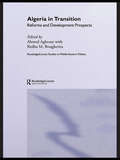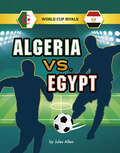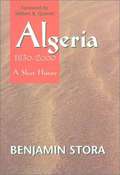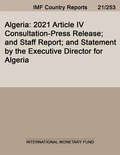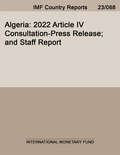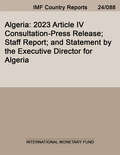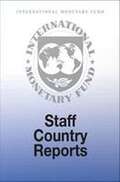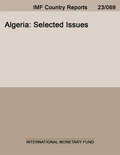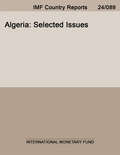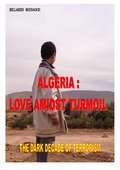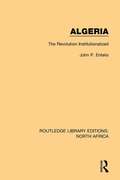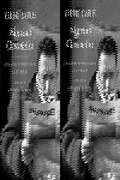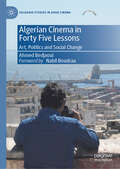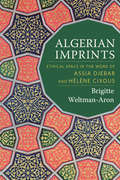- Table View
- List View
Algeria in Transition: Reforms and Development Prospects (Routledge Studies in Middle Eastern Politics)
by Ahmed Aghrout Redha M. BougheriraThis book, by providing an up-to-date, systematic analytical account on transformations in Algeria, makes a valuable contribution to the literature on this country that has not yet received much attention in the Anglo-American academy. Its distinctive feature is that it entirely focuses on Algeria, thus departing from existing studies dealing with the entire geographical area of North Africa or the Maghreb.
Algeria vs. Egypt (World Cup Rivals)
by Jules AllenThe national soccer teams of Algeria and Egypt have a rivalry spanning decades. What made the teams fierce competitors? How are both country’s fans involved in keeping this rivalry going? Easy-to-read text and fantastic images make these books an obvious choice for the soccer-obsessed reluctant or struggling reader.
Algeria, 1830-2000: A Short History
by Jane Marie Todd Benjamin StoraA particularly vicious and bloody civil war has racked Algeria for a decade. Amnesty International notes that since 1992, in a population of 28 million, 80,000 people have been reported killed, and the actual total is almost certainly higher. This terrible war overshadows Algeria's long and complex history and its prominence on the world economic stage—second in size among African nations, Algeria has the longest Mediterranean coastline and contains the world's fifth-largest natural gas reserves. Algeria, 1830-2000 is a comprehensive narrative history of the country. Benjamin Stora, widely recognized as the leading expert on Algeria, presents the story of this turbulent area from the start of formal French colonialism in the early nineteenth century, through the prolonged war for independence in the latter 1950s, to the internal strife of the present day. This book adapts and updates three short volumes published originally in French by La Découverte. For this English edition, Stora has written a new introductory chapter on Algeria's colonial period (1830-1954) and has revised the final section to bring the volume up to date.
Algeria--The Real Exchange Rate, Export Diversification, and Trade Protection
by Piritta SorsaFinancial report from the IMF
Algeria: 2003 Article IV Consultation--Staff Report; Staff Statement; Public Information Notice on the Executive Board Discussion; and Statement by the Executive Director for Algeria
by International Monetary FundFinancial report from the IMF
Algeria: 2005 Article IV Consultation--Staff Report; Staff Statement; Public Information Notice on the Executive Board Discussion; and Statement by the Executive Director for Algeria
by International Monetary FundFinancial report from the IMF
Algeria: 2006 Article IV Consultation--Staff Report; Public Information Notice on the Executive Board Discussion; and Statement by the Executive Director for Algeria.
by International Monetary FundFinancial report from the IMF
Algeria: 2009 Article IV Consultation--Staff Report; and Public Information Notice
by International Monetary FundFinancial report from the IMF
Algeria: 2021 Article IV Consultation-Press Release; and Staff Report; and Statement by the Executive Director for Algeria (Imf Staff Country Reports)
by International Monetary Fund. Middle East and Central Asia Dept.A report from the International Monetary Fund.
Algeria: 2022 Article IV Consultation-Press Release; and Staff Report
by International Monetary Fund. Middle East and Central Asia Dept.A report from the International Monetary Fund.
Algeria: 2023 Article IV Consultation-Press Release; Staff Report; and Statement by the Executive Director for Algeria
by International Monetary Fund. Middle East and Central Asia Dept.A report from the International Monetary Fund.
Algeria: Report on the Observance of Standards and Codes--Fiscal Transparency Module
by Teresa Ter-Minassian Mohsin S. KhanA report from the International Monetary Fund.
Algeria: Selected Issues
by International Monetary FundA report from the International Monetary Fund.
Algeria: Selected Issues (EPub)
by Middle East Gabriel Sensenbrenner Boileau LokoA report from the International Monetary Fund.
Algeria: Selected Issues (Imf Staff Country Reports #Country Report No. 14/342)
by International Monetary Fund. Middle East and Central Asia Dept.A report from the International Monetary Fund.
Algeria: Selected Issues Paper (Imf Staff Country Reports #Country Report No. 14/342)
by International Monetary Fund. Middle East and Central Asia Dept.A report from the International Monetary Fund.
Algeria: Stabilization and Transition to the Market
by Karim Nashashibi Patricia Alonso-Gamo Stefania Bazzoni Alain Féler Nicole Laframboise Sebastian Paris HorvitzThis paper offers Algeria's recent experience with macroeconomic stabilization and systemic transformation from a centrally planned to a market economy. the analyses focuses on the period since 1994 when Algeria embarked on a comprehensive reform program that has benefitted from IMF support, first through a one-year Stand-by Arrangement, and from May 1995, through a three-year arrangement under the Extended Fund Facility. to better understand this experience, this paper provides some background information on Algeria's political history and economic developments during the period preceding the Stand-By arrangement.
Algeria: Statistical Appendix
by International Monetary FundA report from the International Monetary Fund.
Algeria: Statistical Appendix
by International Monetary FundA report from the International Monetary Fund.
Algeria: Statistical Appendix
by International Monetary FundA report from the International Monetary Fund.
Algeria: The Dark Decade of Terrorism (Novel #1)
by Bellaredj BoudaoudIn this story, the author denounces religious fanaticism, assassins, attacks, intolerance, hypocrisy and even a total incomprehension of Islam. A religion that preaches peace and not violence. Generally speaking, violence is inherent in human nature. It takes a commendable effort to suppress it. Our father Adam had two sons: one killed the other. Monotheistic religions strive to neutralize tendencies towards violence through patience, piety and love of neighbor. The author portrays here a realistic and sometimes picturesque image of the life of a people he loves, plunged into the chaos of history, with its violence and dangers, its hopes and passions. Little by little, the truth and exactitude of the details, the non-documentary precision, A religion that preaches peace and not violence.
Algeria: The Revolution Institutionalized (Routledge Library Editions: North Africa #1)
by John P. EntelisAfter over a century of intensive colonial rule and nearly eight years of revolutionary warfare, Algeria emerged in a state of total economic decrepitude and political backwardness. Yet in the two decades following independence in 1962 the country achieved a remarkable degree of political stability and economic growth. This book, first published in 1986, traces the shape of Algeria’s revolutionary experience through an analysis of the country’s culture, history, economy, politics, and foreign policy.
Algerian Chronicles
by Albert CamusMore than 50 years after independence, Algerian Chronicles, with its prescient analysis of the dead end of terrorism, appears here in English for the first time. Published in France in 1958-the year the war caused the collapse of the Fourth French Republic-it is one of Albert Camus’ most political works: an exploration of his commitment to Algeria.
Algerian Cinema in Forty Five Lessons: Art, Politics and Social Change (Palgrave Studies in Arab Cinema)
by Ahmed BedjaouiAlgerian Cinema in Forty Five Lessons offers a fresh approach to examine the history of Algerian cinema, from its inception to the present day, providing in-depth analysis of forty five key films. While most scholarly and critical work on Algerian cinema continues to centre on the War of Independence and those films engaging with it, Dr Ahmed Bedjaoui argues that this thematic dominance has overshadowed many other important aspects of Algerian film history. Further, Bedjaoui examines how "revolutionary" films have frequently depicted an idealized image of a heroic, flawless and fearless figure which has been strategically crafted to legitimize national authority at different points in time. This book offers a new reading, which involves rehabilitating some major but underestimated works, as well as questioning other films primarily known for their contribution to the Algerian national story. Among the works studied, certain productions offer a less Manichean vision of the War of Independence, while explaining the process that led to it. Above all, Bedjaoui strives to bring out of the shadows films of great artistic value (sometimes produced by state television), and compares the productions of the so-called golden age (1960s and 1970s) with the films made by the following generations, in terms of both creativity and capacity to reflect the specificity of Algerian society. Through a contextualization of forty specific films, this book provides a deep analysis of the changes which occurred in the heart of Algerian society, moving from an all-socialist to an all-protectionist state, before being later threatened by religious fundamentalism. Engaging and accessibly written, and including coverage of many films never written about in English-language histories of Algerian cinema, this book is an essential resource for understanding this dynamic and vital film culture.
Algerian Imprints: Ethical Space in the Work of Assia Djebar and Hélène Cixous
by Brigitte Weltman-AronBorn and raised in French Algeria, Assia Djebar and Hélène Cixous represent in their literary works signs of conflict and enmity, drawing on discordant histories so as to reappraise the political on the very basis of dissensus.In a rare comparison of these authors' writings, Algerian Imprints shows how Cixous and Djebar consistently reclaim for ethical and political purposes the demarcations and dislocations emphasized in their fictions. <P><P>Their works affirm the chance for thinking afforded by marginalization and exclusion and delineate political ways of preserving a space for difference informed by expropriation and nonbelonging. Cixous's inquiry is steeped in her formative encounter with the grudging integration of the Jews in French Algeria, while Djebar's narratives concern the colonial separation of "French" and "Arab," self and other. Yet both authors elaborate strategies to address inequality and injustice without resorting to tropes of victimization, challenging and transforming the understanding of the history and legacy of colonized space.
